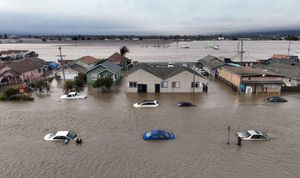Greece is grappling with rising public anger over the handling of the Tempi railway disaster, which killed fifty-seven people nearly two years ago, prompting calls for accountability against the backdrop of political maneuvering.
On February 28, 2023, a tragic collision between a passenger train and a freight train occurred near Tempe, with many victims being college students returning from holiday. The aftermath of this disaster has seen families of the victims take to the streets, demanding justice and transparency from the government. Protests erupted not only across Greece but also from Greek communities as far afield as Amsterdam, Berlin, and Brussels, showcasing widespread discontent.
After growing frustration over delays in investigations and allegations of governmental cover-ups, three opposition parties—the left-wing Syriza, the socialist PASOK, and the New Left—have vowed to challenge the ruling conservative government led by Prime Minister Kyriakos Mitsotakis. Sokratis Famellos, leader of the Syriza party, emphasized the importance of their censure motion, stating, “A joint initiative by progressive parties for a censure motion is necessary today. The evidence is there, and society demands accountability.”
While critics and the opposition allege the government has obstructed justice—pointing to certain railway officials being charged but no senior political figures facing consequences—the government insists it is committed to finding the truth. Mitsotakis, addressing ministers at the Cabinet meeting, acknowledged the turbulence surrounding the tragedy and stated, “This difficult week...comes to a close under the shadow of the Tempe tragedy.”
Further fueling the resolve for protests and political motions was the belief among many Greeks, especially the victims' families, who claim the government is intentionally stalling the investigation and attempting to hide the truth. Maria Karystianou, mother of one of the victims and president of the Association of Relatives of the Victims, has posed several pointed questions to the government, urging for accountability concerning reported malpractices, including the alleged tampering of evidence.
Demonstrations have increased with participants carrying banners with slogans such as “Justice,” “The Tempi crime will not be forgotten,” and “No crime without punishment.” The recent protests were particularly notable, with participants flooding the streets of major cities and even involving various demographics, from students to the elderly. A poll conducted prior to these demonstrations indicated significant dissatisfaction among the populace, with around eighty percent expressing their discontent with the government’s handling of the disaster.
During the protests, tensions escalated, resulting in clashes between demonstrators and police forces, particularly prominent during the demonstration at Parliament Square, where members of the anarchist black bloc were among the crowd. Protesters voiced their frustrations not just about the specific railway disaster but also about broader systemic issues, including perceived negligence and the de-funding of public services under the current government.
Opposition parties are utilizing the discontent as leverage against the ruling New Democracy party, with the censure motion seen as more than just political posturing—it’s viewed as part of the larger struggle for ensuring justice for the victims. Although analysts suggest the censure motion is unlikely to topple the government, it could help solidify opposition unity and pressure the administration to act decisively on the issues raised.
Following the latest demonstrations, Mitsotakis has sought to distance himself from culpability, claiming he has been misled by investigative teams and asserting, “We will get to the bottom of this tragedy.” He also stated he bears no responsibility for the actions of others, which sparked backlash from opposition leaders and the general public.
The public outcry following the Tempi tragedy has not only reignited calls for justice but has also placed significant political pressure on the Greek government as it faces inquiries related to safety regulations and management of public infrastructure. Mitsotakis's government is now being closely monitored as they navigate this crisis, with the opposition poised to rise against any perceived negligence.
This atmosphere of distrust and anger is likely to persist, with family members, activists, and citizens determined to see accountability upheld. More demonstrations are anticipated, especially as the two-year anniversary of the crash approaches, with the frustration over the initial investigations still palpable among many Greeks.
Whether the government can successfully overcome this storm or if public outrage will lead to substantial political change remains to be seen. Amid growing calls for transparency, the stakes are high for the ruling party, as public sentiment continues to sway against them.



